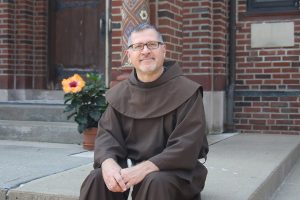The film “The Sultan and the Saint” tells a tale of an 800-year-old encounter between St. Francis of Assisi and the sultan of Egypt on a battlefield during the infamous crusades.
Centuries later, Michael Calabria, OFM, said this historical event is increasingly relevant.

“Although it’s portraying a historical encounter 800 years ago, this film has enormous relevance and importance for conversations about interfaith relations and interreligious dialogue,” Calabria said.
At 2 p.m. Tuesday, Aug. 21, in the Hall of Philosophy, Calabria will discuss the importance of this movie, his role in production and the intersection of religion and film during his lecture, “The Sultan and the Saint: A Franciscan Reflection on an Interfaith Encounter.” This lecture is part of the Week Nine interfaith theme, “The Intersection of Cinema and Religious Values.”
Calabria, founding director of the center for Arab and Islamic Studies at St. Bonaventure University, served as a consultant for “The Sultan and the Saint,” which was released in 2016. The Unity Productions Foundation film has been nominated for an Emmy Award and received 19 other accolades. “The Sultan and the Saint” will be screened at 4 p.m. Tuesday, Aug. 21, at the Chautauqua Cinema, and Calabria will participate in a talkback following the film.
Calabria said his role on set was to engage in conversation with director Alex Kronemer, an experience that gave him an inside perspective about the depth of the film. For his lecture, he said he will share his reflections with Chautauquans.
“I’m going to highlight and supplement some things about the film, so that when people see it, they have a little bit more information,” he said. “I want to really flesh out why this encounter continues to be so relevant.”
Though the film focuses on a historical religious event, Calabria said its purpose is not confined solely to religious discussion. He believes films like “The Sultan and the Saint” play a larger role in demonstrating the long and disputed struggle for tolerance, among other social issues.
“Very often, religious films are made because they are speaking to a contemporary issue or audience, even though they may be portraying a Biblical incident or a historical incident from the distant past,” he said. “So religious films can often speak to our contemporary experience of society, of politics and of various social issues, one of which is religion.”
Calabria has a personal history of interfaith work and teaches courses on Islam, the Quran, Christian-Muslim relations and Middle Eastern culture. He also serves as the special assistant for dialogue with Islam for the Order of Friars Minor.
In his role at St. Bonaventure, Calabria said his center targets four different disciplines: on-campus instruction, off-campus instruction, scholarship and community outreach. He said each of the center’s responsibilities targets a different aspect of interfaith work through Islamic studies.
On-campus and off-campus instruction includes lectures, courses and other educational opportunities, while scholarship and community outreach look toward impacting the larger community.
“Scholarship refers to the scholarship that I engage in in the field of Islamic studies, which involves presenting at conferences and things like publishing a newsletter,” Calabria said. “The community outreach refers to reaching out to the Muslim community locally, within New York state and internationally, as well.”




